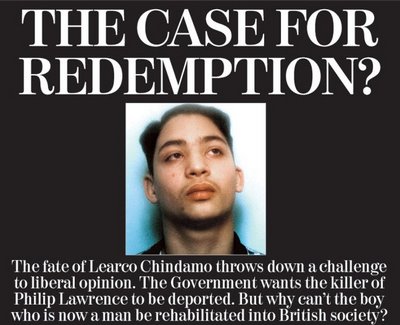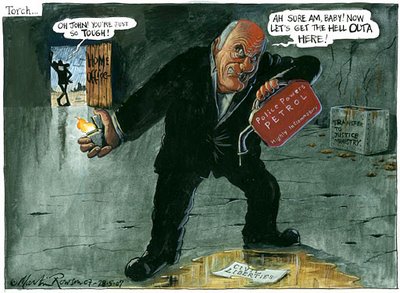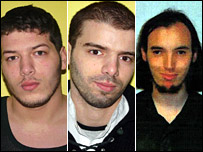Standing in the way of control.
 It's Christmas Eve, so let's have a shooting fish in a barrel contest. Tony McNulty, the ghastly minister of state for security, counter terrorism, crime and policing writes into the Grauniad to defend control orders after Gareth Peirce, one of the lawyers acting for some of those under them savaged them last week:
It's Christmas Eve, so let's have a shooting fish in a barrel contest. Tony McNulty, the ghastly minister of state for security, counter terrorism, crime and policing writes into the Grauniad to defend control orders after Gareth Peirce, one of the lawyers acting for some of those under them savaged them last week:Gareth Peirce's article (Britain's own Guantánamo, December 21) seriously exaggerates both the use of, and conditions for individuals on, control orders.
How then does McNulty defend control orders? By, err, exaggerating the safeguards, and being downright evasive and selective in regurgitating some of the facts.
The UK faces an unprecedented threat from terrorism and the government's top priority is to protect the public. There are certain individuals who we have strong suspicion are involved in terrorist activity but who we cannot prosecute or, if they are foreign nationals, deport.
This to begin with is nonsense. If the evidence held against the men was made admissible, most of which was obtained through phone-tapping, then they could almost certainly be tried. There is of course another suspicion as to why they haven't been prosecuted: that the intelligence is so thin that even if wiretapping was admissible it still wouldn't be enough for the CPS to authorise a prosecution. McNulty strangely doesn't mention that they are attempting to deport many "terrorist suspects" under "articles of understanding" to countries where torture is endemic, a piece of paper promising that such brutality won't be used against our returnees.
Peirce's claim that considerable numbers of people don't know the case against them is simply wrong. We use control orders only in a limited number of carefully selected cases. Fourteen people are currently subject to a control order and none of them is under house arrest. Control order obligations are tailored to the risk posed by the individual concerned.
I don't know about you, but I would describe a 16-hour home curfew, which is what most of those on control orders are under, where they are electronically tagged, have to report to a police station daily, are denied access to the internet or telephone, and are only allowed very select visitors who are authorised in advanced as little better than house arrest.
There are also strong safeguards to protect their rights. For example, where a controlled person cannot see the evidence against them for security reasons, an independent legal representative is appointed who can see the evidence and make representations on their behalf. And each control order is subject to mandatory review by the high court.
But that representative, who is appointed by the state, not the defendant, still cannot inform the person under the control order what the allegations against them are. To know what you are accused of has been a right since the dark ages, that's how far the Kafkaesque control order system has dragged us back. That each control order is subject to mandatory review makes little difference: when Mr Justice Beatson quashed an order on a Tunisian and made clear that he felt he should be prosecuted, the former home secretary John Reid just imposed a slightly less restrictive order on him and completely ignored the judge's recommendation.
The House of Lords recently endorsed the principles of the control order regime, and the independent reviewer of counter-terrorism legislation, Lord Carlile, concluded in his last annual report that control orders remained a necessary and proportionate response to the current threat.
Now this is where the bullshit really starts to fly. The law lords most certainly did not endorse the "principles of the control order regime"; it was asked to rule on whether 18-hour curfews under control orders were in breach of Article 5 of the Human Rights Act, the right to liberty, which they duly found that they were. They did however rule that 12-hour curfews were permissible, and because Lord Brown in a dissenting opinion wrote that he thought 16-hour curfews were also potentially legal, the wonderful Jacqui Smith immediately pounced and in some cases made the orders more restrictive as a result. The law lords also ruled that those under the orders and their lawyers must be given access to some of the secret evidence currently held from them, although how this will work out in practice is still yet to be ascertained. As for Lord Carlile, he seems to have gone native.
I wish we did not need control orders. Sadly, given the threat we face and the activities certain individuals are undertaking to harm us, we do.
If the government really wanted to, it could easily prosecute all of those under the orders, some of whom have never even been questioned by the police. That it still refuses to and also seems to continue to refuse to make phone-tap evidence admissible shows up McNulty's closing remarks as utterly self-serving.
So, err, merry Winterval! Be back in a couple of days and I'll probably do a best of, best and worst music of the year and most likely some other tedious shite. Have a good one.
Labels: control orders, fisks, Gareth Peirce, terror, terrorism, Tony McNulty, war against bullshit





